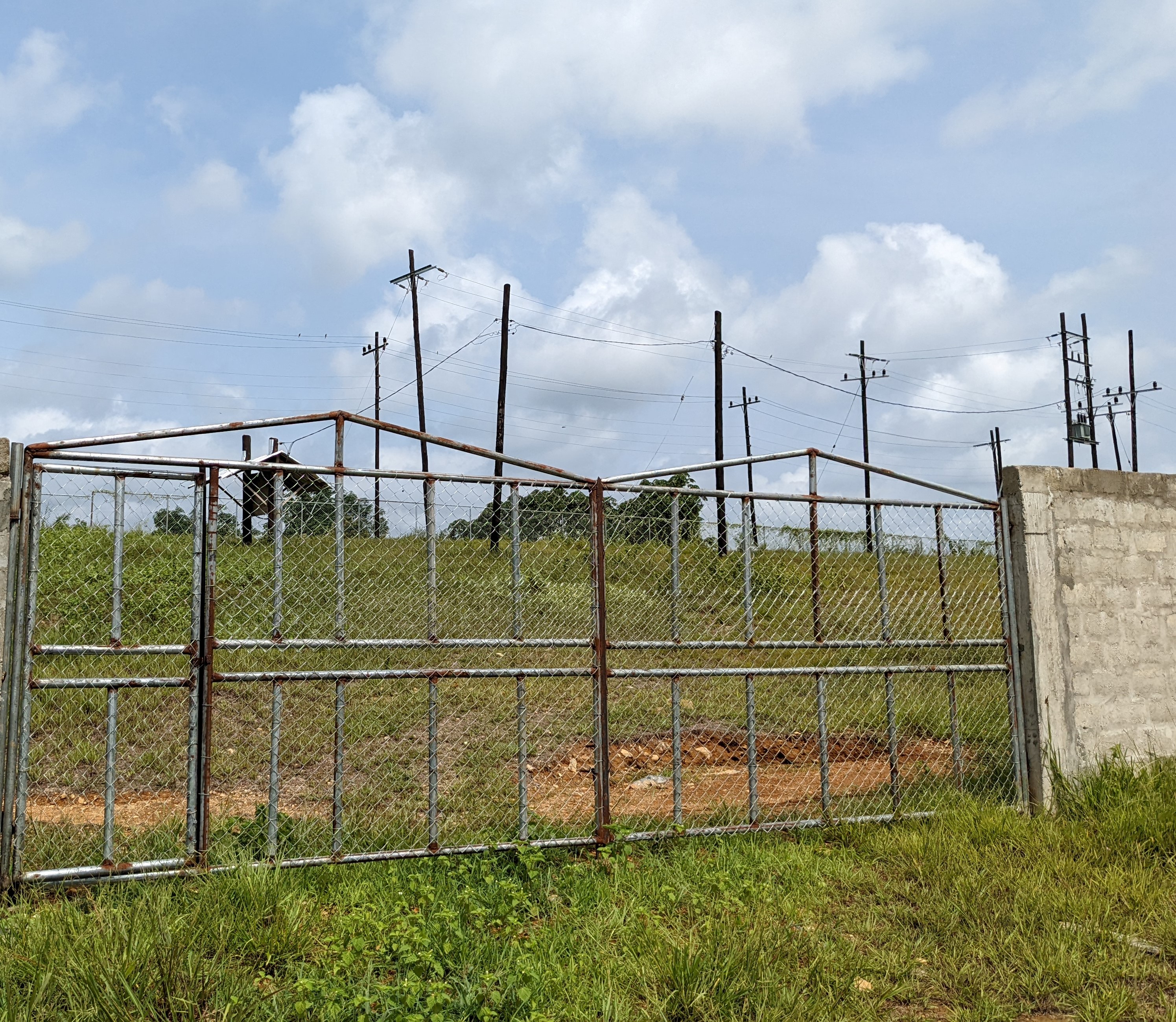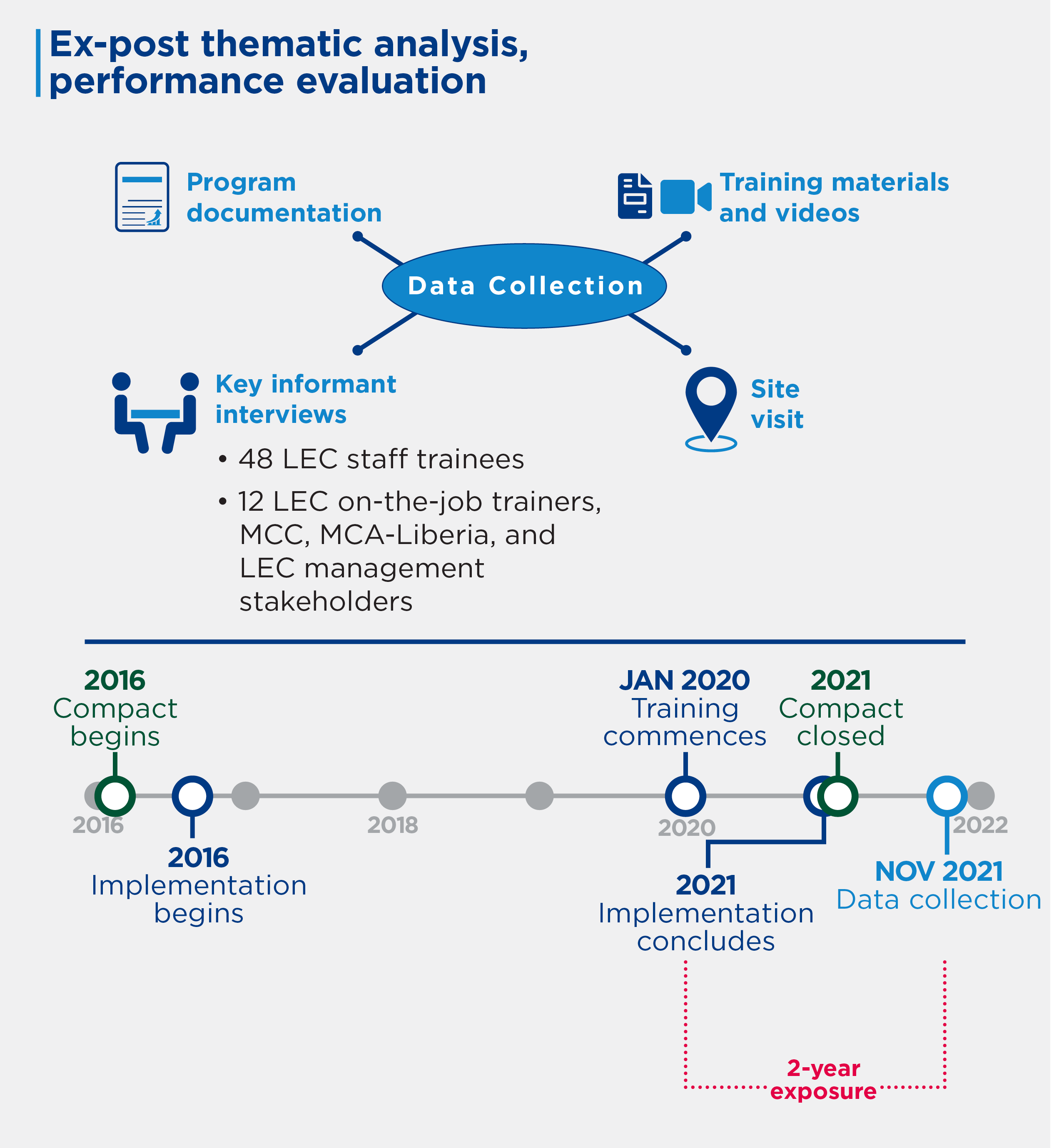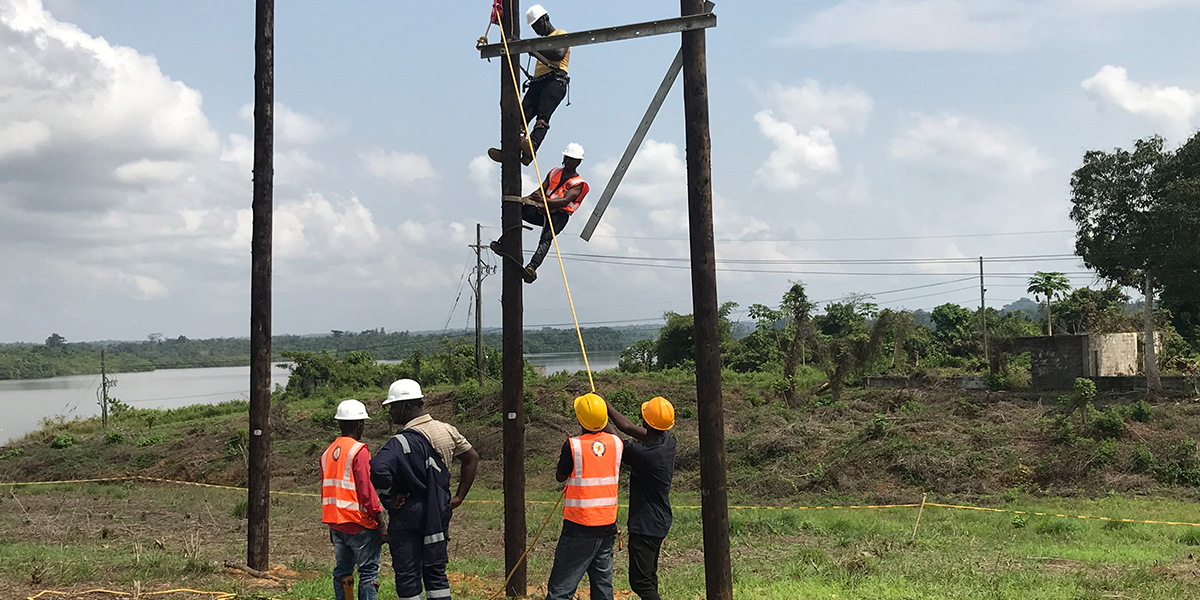Program Overview
MCC’s $238 million Liberia Compact (2016-2021) funded the $2.2 million Liberia Electricity Corporation Training Center Activity, a workforce development initiative designed to improve the skills and capacity of Liberia’s electricity utility staff. The activity was based on the theory that by investing in workforce development with a train-the-trainer model, implementing an on-the-job training program, and building an outdoor training center, utility staff would increase their skills and productivity and ultimately improve electricity quality and the financial sustainability of the Liberia Electricity Corporation.Evaluator Description
MCC commissioned Mathematica to conduct an independent final performance evaluation of the LEC Training Activity. Full report results and learning: https://mcc.icpsr.umich.edu/evaluations/index.php/catalog/278.
Key Findings
Activity Design, Scope, and Delivery
- A reduced budget led to a virtual training delivered to 300 utility staff and 36 trainers.
- The training did not address gaps in Liberia Electricity Corporation’s (LEC) capabilities but exceeded targets for learner satisfaction, course completion, and knowledge.
Training Effectiveness
- Commercial staff felt trainings were relevant and useful.
- Technical staff, including lineworkers, wanted hands-on training focused on repairing systems and meters at the utility, which is essential to address power failures due to widespread power theft. Repair work is also challenged with limited availability of tools and parts. They said the content focused too much on how equipment should work.
Ongoing Workforce Development and Sustainability
- The utility needs major reform and resources to develop the workforce. LEC’s ability to operate critical infrastructure is compromised without continuous, regular training.
- On-the-job trainers lack resources and support for ongoing training.
- The Outdoor Center has been underutilized due to equipment shortages.
Evaluation Questions
This final performance evaluation was designed to answer the following questions:- 1 How did the Liberia Electricity Corporation (LEC) Training Activity function in practice? How effective was the LEC Training Activity?
- 2 To what extent did the LEC Training Activity meet skill needs at LEC (number of staff trained and the quality and relevance of skills)?
- 3 How sustainable is the LEC Training Activity?
Detailed Findings
Activity Design, Scope, and Delivery
Acknowledging critical gaps in the Liberia Electricity Corporation’s (LEC) human resource capabilities, the original scope of the LEC Training Activity included the construction of a fully equipped training center, cross-departmental training of trainers, and a robust schedule of hands-on training facilitated by LEC trainers. In 2019, MCC’s resources were diverted to avoid catastrophic failure at the Mt. Coffee Hydropower Plant, where additional operations staff were needed. The reduced scope included a one-time training of trainers, classroom training of LEC staff, and construction of an outdoor training center. The India-based training consultant conducted most training virtually given the COVID-19 pandemic, reaching about a third of LEC’s approximately 930 staff and exceeding learner satisfaction, course completion, and knowledge targets. While the activity represented an important training for 2020, LEC’s vast human resource capacity needs continue to grow as the network expands, generation capacity grows, and customer connections increase.
Timeline of implementation
Training Effectiveness
LEC staff differed in how they rated the relevance of training. While the training of trainers was generally well received, the virtual format resulted in limited skill building and individualized feedback to trainees.
Outdoor Training Center at LEC with electricity poles used for training.
Ongoing Workforce Development and Sustainability
LEC has made notable progress establishing and building the Training and Development Department, but LEC’s poor financial situation and reliance on external partners pose a threat to the LEC Training Activity’s sustainability. LEC staff recognize that training must be a continuous process of skill development, expansion, and reinforcement, rather than a one-time event. However, staff reported that insufficient administrative support and equipment shortages are a barrier to permanently applying the best practices. LEC management and donors expressed concern about LEC’s ability to operate independently and maintain critical infrastructure such as the Mount Coffee Hydropower Plant.The outdoor training center was designed and constructed but has been underutilized due to equipment shortages. Assets are hard to retain for training given that they are being used for the network. As of May 2022, plans for additional training equipment and trainee lodging were on hold due to LEC’s financial crisis.
Respondents reported that on-the-job training has been implemented inconsistently since the trainings. While two thirds of trainers reported conducting at least some training, it was generally brief or lacked structure because of LEC’s limited resources. There was also uncertainty about the processes and approvals needed to conduct training.
LEC requires additional, regular investments to adequately maintain electricity assets and infrastructure, improve revenue collection, decrease loss reduction and illegal connections, and become more financially sustainable. LEC’s growing patchwork of electricity assets and infrastructure require that LEC staff receive sustained, intensive training and continuous capacity building to instill the skills needed to operate and maintain complex infrastructure. This study shows that one-time and piecemeal trainings, implemented and funded by different organizations, have been insufficient to yield the knowledge and expertise needed for staff to operate and maintain LEC’s assets, equipment, and infrastructure.
MCC Learning
- The program could have had a longer term, more sustainable impact if the training had been more substantial than a one-time offering.
- Activities added late in the compact development process should be adequately resourced and accelerated before final approval and implementation of the activity.
Evaluation Methods

2023-002-2782


